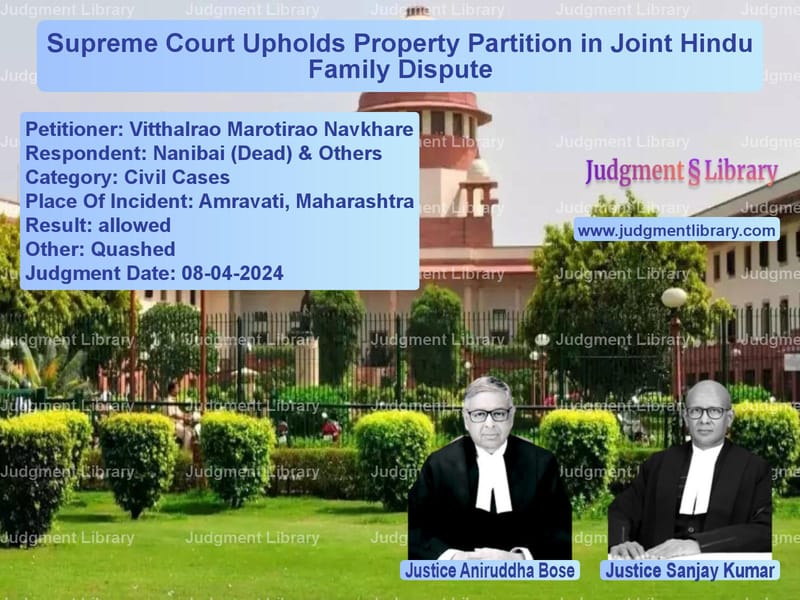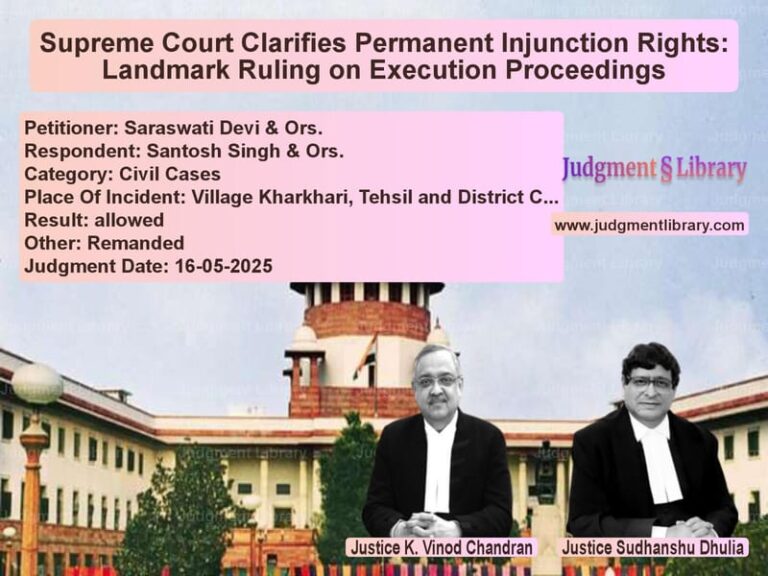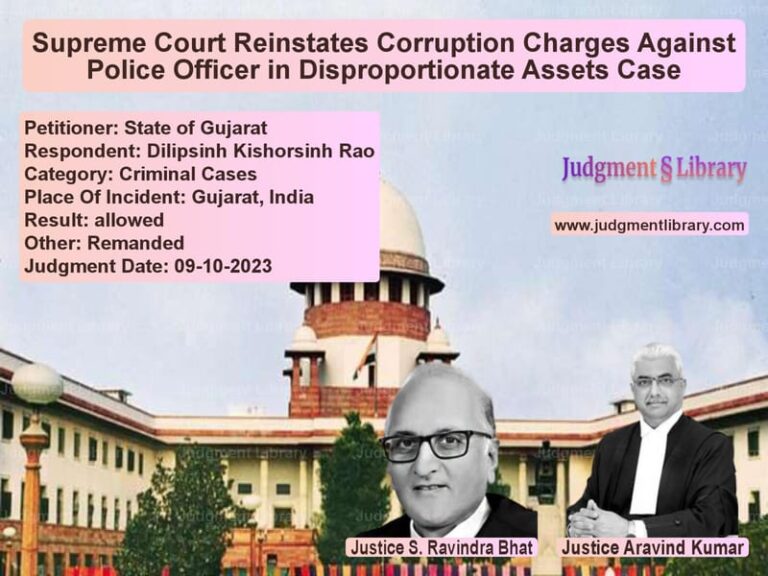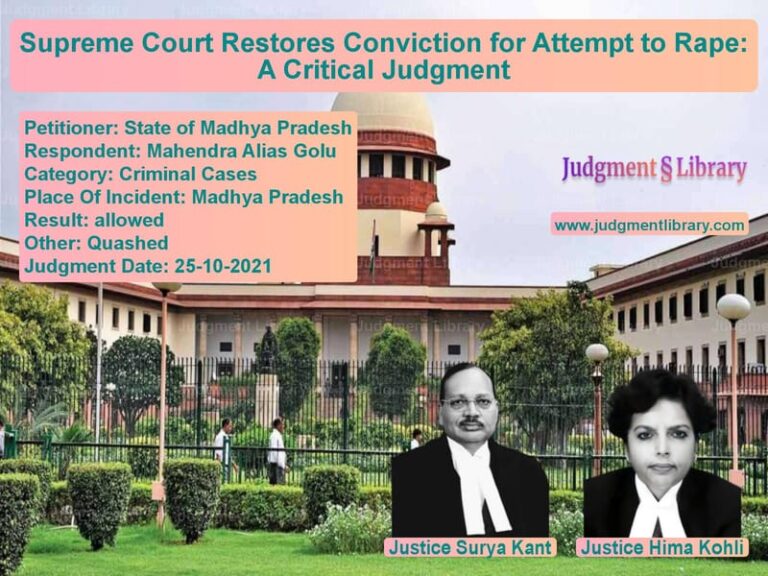Supreme Court Upholds Property Partition in Joint Hindu Family Dispute
The case of Vitthalrao Marotirao Navkhare vs. Nanibai (Dead) & Others revolves around a dispute concerning the partition of joint family property, including agricultural lands and a business. The Supreme Court was called upon to determine whether the properties in question were ancestral in nature and liable for partition under Hindu law.
Background of the Case
The appellant, Vitthalrao Marotirao Navkhare, filed a suit (Spl. C.S. No. 286 of 2005) before the Civil Judge (Senior Division), Amravati, seeking partition and separate possession of the suit properties. The properties included agricultural lands and a business known as Gajanan Automobiles. The main parties involved were:
- Vitthalrao (plaintiff, appellant in this case).
- Defendants 1 to 6: Widow and children of his deceased brother, Laxmanrao.
- Defendant 7: Wife of the plaintiff.
The core dispute arose over whether the suit properties were joint family property or self-acquired by Laxmanrao. Defendants 1 to 6 filed a counter-claim seeking a perpetual injunction to prevent the plaintiff from interfering in the business operations.
Trial Court Judgment
On February 29, 2008, the Trial Court ruled that:
- The plaintiff was entitled to partition of only the agricultural land in Survey No. 22/1-A at Mouza Shendola, as it was ancestral.
- The rest of the properties were self-acquired by Laxmanrao and not subject to partition.
- Laxmanrao was the sole owner of Gajanan Automobiles, and the plaintiff had no interest in the business.
- The counter-claim of Defendants 1 to 6 was allowed.
Appellate Court Ruling
The plaintiff appealed to the District Judge-III, Amravati (Regular Civil Appeal No. 69 of 2008), which reversed the Trial Court’s findings on November 14, 2008 and held that:
- The plaintiff had a half-share in all the suit properties.
- The entire business of Gajanan Automobiles was joint family property.
- The counter-claim of Defendants 1 to 6 was dismissed.
High Court Proceedings
Defendants 1 to 6 challenged the Appellate Court’s decision before the Bombay High Court (Nagpur Bench) in Second Appeal No. 38 of 2009. The High Court dismissed the appeal on November 24, 2018, confirming that:
- The business was joint family property.
- The properties purchased using business income were subject to partition.
However, the High Court’s judgment contained an observation that the joint business started in 1991. Based on this, Defendants 1 to 6 filed a review petition (Misc. Civil Application No. 46 of 2019) seeking to exclude certain properties from partition.
The High Court, on March 22, 2019, allowed the review, holding that:
- Properties acquired before 1991 were self-acquired by Laxmanrao and should be excluded from partition.
This led to the present appeal before the Supreme Court.
Arguments by the Appellant (Plaintiff)
- The High Court misinterpreted its own judgment and wrongly excluded certain properties.
- The review order was based on an erroneous assumption that the joint business started in 1991.
- Laxmanrao had admitted under oath that the business was joint family property.
- The properties were purchased using business income and should be included in partition.
Arguments by the Respondents (Defendants 1 to 6)
- The properties excluded in the review order were purchased before 1991 and were Laxmanrao’s self-acquired properties.
- The business was not joint but owned solely by Laxmanrao.
- The plaintiff separated from the family business in 2003, proving that it was not joint family property.
Supreme Court’s Analysis and Judgment
The Supreme Court carefully examined the evidence, noting:
- Contradictory Stand by Respondents: Defendants 1 to 6 had earlier claimed that the plaintiff separated in 2003, yet also argued there was never a joint business.
- Oath Statement by Laxmanrao: The deceased had admitted in court that he was the Karta (Manager) of a joint family business.
- Review Petition Based on a Misinterpretation: The High Court’s earlier judgment never stated that the business became joint only in 1991.
- Properties Purchased with Business Income: The properties excluded in the review were bought using earnings from Gajanan Automobiles.
The Supreme Court ruled:
“The High Court erred in reviewing its own judgment based on an incorrect interpretation. The business and the properties in question were joint family assets and liable for partition.”
Supreme Court’s Final Order
- The review order dated March 22, 2019 was set aside.
- The judgment of the District Judge-III, Amravati (November 14, 2008) was restored.
- The plaintiff was granted half-share in all the suit properties.
- The counter-claim by Defendants 1 to 6 was dismissed.
Legal Implications of the Judgment
This ruling has significant implications:
- Joint family property must be partitioned unless proven otherwise.
- Statements under oath by a deceased family member are binding on successors.
- Review petitions must be based on valid errors and not misinterpretations.
- Income from joint businesses is treated as family property.
Conclusion
The Supreme Court’s ruling reaffirms the principle that joint family businesses and properties cannot be arbitrarily claimed as self-acquired by one member. This judgment ensures that legal heirs receive their rightful share in ancestral and joint family assets.
Petitioner Name: Vitthalrao Marotirao Navkhare.Respondent Name: Nanibai (Dead) & Others.Judgment By: Justice Aniruddha Bose, Justice Sanjay Kumar.Place Of Incident: Amravati, Maharashtra.Judgment Date: 08-04-2024.
Don’t miss out on the full details! Download the complete judgment in PDF format below and gain valuable insights instantly!
Download Judgment: vitthalrao-marotirao-vs-nanibai-(dead)-&-oth-supreme-court-of-india-judgment-dated-08-04-2024.pdf
Directly Download Judgment: Directly download this Judgment
See all petitions in Property Disputes
See all petitions in Succession and Wills
See all petitions in Contract Disputes
See all petitions in Judgment by Aniruddha Bose
See all petitions in Judgment by Sanjay Kumar
See all petitions in allowed
See all petitions in Quashed
See all petitions in supreme court of India judgments April 2024
See all petitions in 2024 judgments
See all posts in Civil Cases Category
See all allowed petitions in Civil Cases Category
See all Dismissed petitions in Civil Cases Category
See all partially allowed petitions in Civil Cases Category







